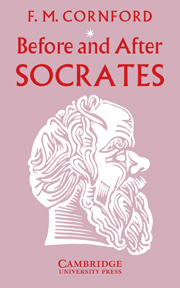Summary
A student in any branch of knowledge who is invited to set before a popular audience, within the space of four hours, the gist and upshot of his studies, may do well to submit himself to the discipline implied. He knows that the expert will frown upon some of his statements as questionable in content and dogmatic in tone, and will mark the omission of many things for which no room could be found. But it will do him good to sit back in his chair and look for the main outline, so often obscured by detail. It seemed clear that Socrates must be taken as the central figure in the period allotted to me, and that my business was to convey the significance of his conversion of philosophy from the study of Nature to the study of human life. I have tried, accordingly, so to describe the early Ionian science as to show why it failed to satisfy Socrates, and I have treated the systems of Plato and Aristotle as attempts to carry into the interpretation of the world the consequences of Socrates' discovery. I have gained a fuller understanding of that discovery from M. Henri Bergson's book, Les deux sources de la morale et de la religion, which came into my hands when I was meditating these lectures.
- Type
- Chapter
- Information
- Before and after Socrates , pp. ix - xPublisher: Cambridge University PressPrint publication year: 1932

